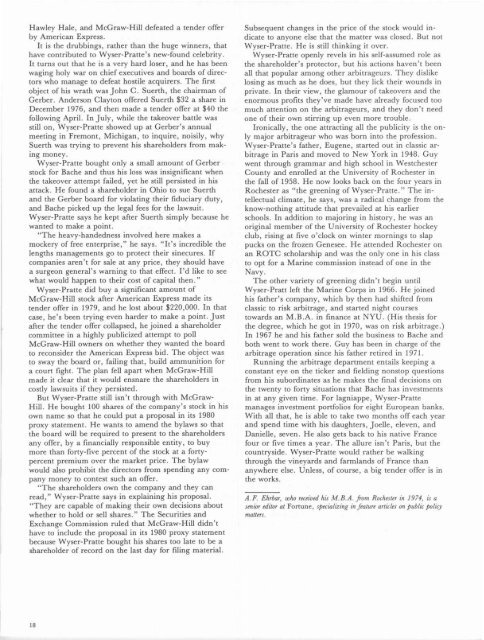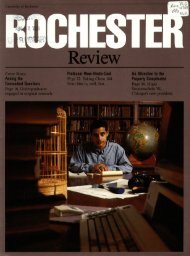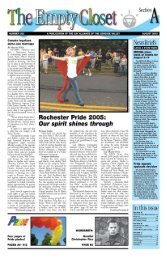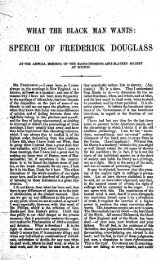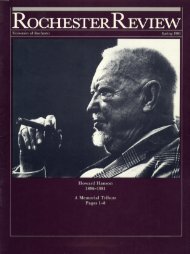Download PDF - University of Rochester Libraries
Download PDF - University of Rochester Libraries
Download PDF - University of Rochester Libraries
You also want an ePaper? Increase the reach of your titles
YUMPU automatically turns print PDFs into web optimized ePapers that Google loves.
Hawley Hale, and McGraw-Hill defeated a tender <strong>of</strong>fer<br />
by American Express.<br />
It is the drubbings, rather than the huge winners, that<br />
have contributed to Wyser-Pratte's new-found celebrity.<br />
It turns out that he is a very hard loser, and he has been<br />
waging holy war on chief executives and boards <strong>of</strong> directors<br />
who manage to defeat hostile acquirers. The first<br />
object <strong>of</strong> his wrath was John C. Suerth, the chairman <strong>of</strong><br />
Gerber. Anderson Clayton <strong>of</strong>fered Suerth $32 a share in<br />
December 1976, and then made a tender <strong>of</strong>fer at $40 the<br />
following April. In July, while the takeover battle was<br />
still on, Wyser-Pratte showed up at Gerber's annual<br />
meeting in Fremont, Michigan, to inquire, noisily, why<br />
Suerth was trying to prevent his shareholders from making<br />
money.<br />
Wyser-Pratte bought only a small amount <strong>of</strong> Gerber<br />
stock for Bache and thus his loss was insignificant when<br />
the takeover attempt failed, yet he still persisted in his<br />
attack. He found a shareholder in Ohio to sue Suerth<br />
and the Gerber board for violating their fiduciary duty,<br />
and Bache picked up the legal fees for the lawsuit.<br />
Wyser-Pratte says he kept after Suerth simply because he<br />
wanted to make a point.<br />
"The heavy-handedness involved here makes a<br />
mockery <strong>of</strong> free enterprise," he says. "It's incredible the<br />
lengths managements go to protect their sinecures. If<br />
companies aren't for sale at any price, they should have<br />
a surgeon general's warning to that effect. I'd like to see<br />
what would happen to their cost <strong>of</strong> capital then."<br />
Wyser-Pratte did buy a significant amount <strong>of</strong><br />
McGraw-Hill stock after American Express made its<br />
tender <strong>of</strong>fer in 1979, and he lost about $220,000. In that<br />
case, he's been trying even harder to make a point. Just<br />
after the tender <strong>of</strong>fer collapsed, he joined a shareholder<br />
committee in a highly publicized attempt to poll<br />
McGraw-Hill owners on whether they wanted the board<br />
to reconsider the American Express bid. The object was<br />
to sway the board or, failing that, build ammunition for<br />
a court fight. The plan fell apart when McGraw-Hill<br />
made it clear that it would ensnare the shareholders in<br />
costly lawsuits if they persisted.<br />
But Wyser-Pratte still isn't through with McGraw<br />
Hill. He bought 100 shares <strong>of</strong> the company's stock in his<br />
own name so that he could put a proposal in its 1980<br />
proxy statement. He wants to amend the bylaws so that<br />
the board will be required to present to the shareholders<br />
any <strong>of</strong>fer, by a financially responsible entity, to buy<br />
more than forty-five percent <strong>of</strong> the stock at a fortypercent<br />
premium over the market price. The bylaw<br />
would also prohibit the directors from spending any company<br />
money to contest such an <strong>of</strong>fer.<br />
"The shareholders own the company and they can<br />
read," Wyser-Pratte says in explaining his proposal.<br />
"They are capable <strong>of</strong> making their own decisions about<br />
whether to hold or sell shares." The Securities and<br />
Exchange Commission ruled that McGraw-Hill didn't<br />
have to include the proposal in its 1980 proxy statement<br />
because Wyser-Pratte bought his shares too late to be a<br />
shareholder <strong>of</strong> record on the last day for filing material.<br />
18<br />
Subsequent changes in the price <strong>of</strong> the stock would indicate<br />
to anyone else that the matter was closed. But not<br />
Wyser-Pratte. He is still thinking it over.<br />
Wyser-Pratte openly revels in his self-assumed role as<br />
the shareholder's protector, but his actions haven't been<br />
all that popular among other arbitrageurs. They dislike<br />
losing as much as he does, but they lick their wounds in<br />
private. In their view, the glamour <strong>of</strong> takeovers and the<br />
enormous pr<strong>of</strong>its they've made have already focused too<br />
much attention on the arbitrageurs, and they don't need<br />
one <strong>of</strong> their own stirring up even more trouble.<br />
Ironically, the one attracting all the publicity is the only<br />
major arbitrageur who was born into the pr<strong>of</strong>ession.<br />
Wyser-Pratte's father, Eugene, started out in classic arbitrage<br />
in Paris and moved to New York in 1948. Guy<br />
went through grammar and high school in Westchester<br />
County and enrolled at the <strong>University</strong> <strong>of</strong> <strong>Rochester</strong> in<br />
the fall <strong>of</strong> 1958. He now looks back on the four years in<br />
<strong>Rochester</strong> as "the greening <strong>of</strong> Wyser-Pratte." The intellectual<br />
climate, he says, was a radical change from the<br />
know-nothing attitude that prevailed at his earlier<br />
schools. In addition to majoring in history, he was an<br />
original member <strong>of</strong> the <strong>University</strong> <strong>of</strong> <strong>Rochester</strong> hockey<br />
club, rising at five o'clock on winter mornings to slap<br />
pucks on the frozen Genesee. He attended <strong>Rochester</strong> on<br />
an ROTC scholarship and was the only one in his class<br />
to opt for a Marine commission instead <strong>of</strong> one in the<br />
Navy.<br />
The other variety <strong>of</strong> greening didn't begin until<br />
Wyser-Pratt left the Marine Corps in 1966. He joined<br />
his father's company, which by then had shifted from<br />
classic to risk arbitrage, and started night courses<br />
towards an M.B.A. in finance at NYU. (His thesis for<br />
the degree, which he got in 1970, was on risk arbitrage.)<br />
In 1967 he and his father sold the business to Bache and<br />
both went to work there. Guy has been in charge <strong>of</strong> the<br />
arbitrage operation since his father retired in 1971.<br />
Running the arbitrage department entails keeping a<br />
constant eye on the ticker and fielding nonstop questions<br />
from his subordinates as he makes the final decisions on<br />
the twenty to forty situations that Bache has investments<br />
in at any given time. For lagniappe, Wyser-Pratte<br />
manages investment portfolios for eight European banks.<br />
With all that, he is able to take two months <strong>of</strong>f each year<br />
and spend time with his daughters, Joelle, eleven, and<br />
Danielle, seven. He also gets back to his native France<br />
four or five times a year. The allure isn't Paris, but the<br />
countryside. Wyser-Pratte would rather be walking<br />
through the vineyards and farmlands <strong>of</strong> France than<br />
anywhere else. Unless, <strong>of</strong> course, a big tender <strong>of</strong>fer is in<br />
the works.<br />
A.F. Ehrbar, who received his M.B.A. from <strong>Rochester</strong> in 1974, is a<br />
senior editor at Fortune, specializing in feature articles on public policy<br />
matters.


